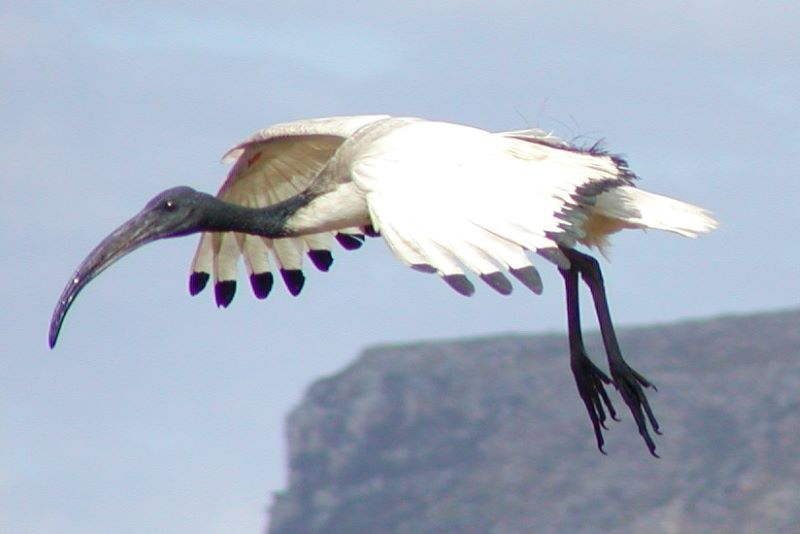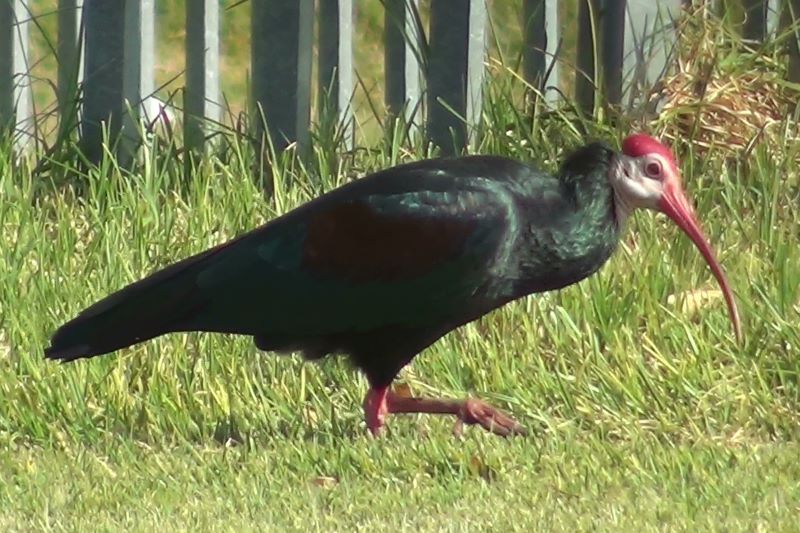The ibis and spoonbill family, Threskiornithidae
There are 6 spoonbill species and 29 ibis species globally. They are medium-sized to large wading and terrestrial birds with longish neck and legs. Their bills are long, thin and decurved, or broad and flat. Ibises and spoonbills are found on all continents other than Antarctic, with the highest diversity in the tropics. They are found in wetlands, with some species in forests, grassland and arid or semi-arid plains.

Ibises all have long, down-curved bills, while spoonbills have unique ladle-shaped bills. They usually feed in groups, probing mud or soft ground for food, especially crustaceans and worms. They are monogamous and highly territorial while nesting and feeding. They usually nest in trees or reedbeds.
There are 11 ibis and 2 spoonbill species found in Africa, and islands (including Madagascar).

Ibis foraging sensors
Birds in three families have been described as having a honeycomb pattern of pitting in the bones of the bill tips: probing shorebirds (Scolopacidae), the kiwi (Apterygidae), and ibises (Threskiornithidae). These are used while probing to detect the small vibrations made by prey as they burrow or swim through soil, mud or water (“Remote touch”). More aquatic ibises appear to have more extensive and densely pitted bill-tip organs than terrestrial ibises. These birds may therefore be able to locate prey hidden both underground and within the water column.

Bill and tarsus length
Plotting bill and tarsus lengths for the African ibises and spoonbills shows a very general increase that is possibly best described by a polynomial of order 2. The Glossy Ibis is an outlier, with longer legs (tarsus as proxy) relative to its bill length, than in all the other species.

Longevity records
There are longevity records for the southern African species. Ringed column indicates number ringed / resighted or recaptured / recovered (as on 2 Dec 2019). Longevity in years months days (y m d). Click on ring number to see SAFRING details. See longevity records for more southern African species here.
| Spno | Species | Ringed | Longevity | Notes | Ringno |
| 81 | African Sacred Ibis Threskiornis aethiopicus | 8986 / 100 / 344 | 21y 1m 6d | SAFRING story | 52601770 |
| 82 | Southern Bald Ibis Geronticus calvus | 637 / 2 / 5 | 5y 5m 4d ±15 | 812185 | |
| 83 | Glossy Ibis Plegadis falcinellus | 639 / 0 / 10 | 16y 4m 3d | 12y 9m 27d in Rose et al. 2019; SAFRING story | 710876 |
| 84 | Hadeda Ibis Bostrychia hagedash | 951 / 1067 / 48 | 10y 4m 21d | SAFRING story | 836378 |
| 85 | African Spoonbill Platalea alba | 650 / 20 / 33 | 14y 0m 28d | 903022 |

| If you would like to ring ibises or other birds, book a trip with Dieter at Birds4Africa ! |
